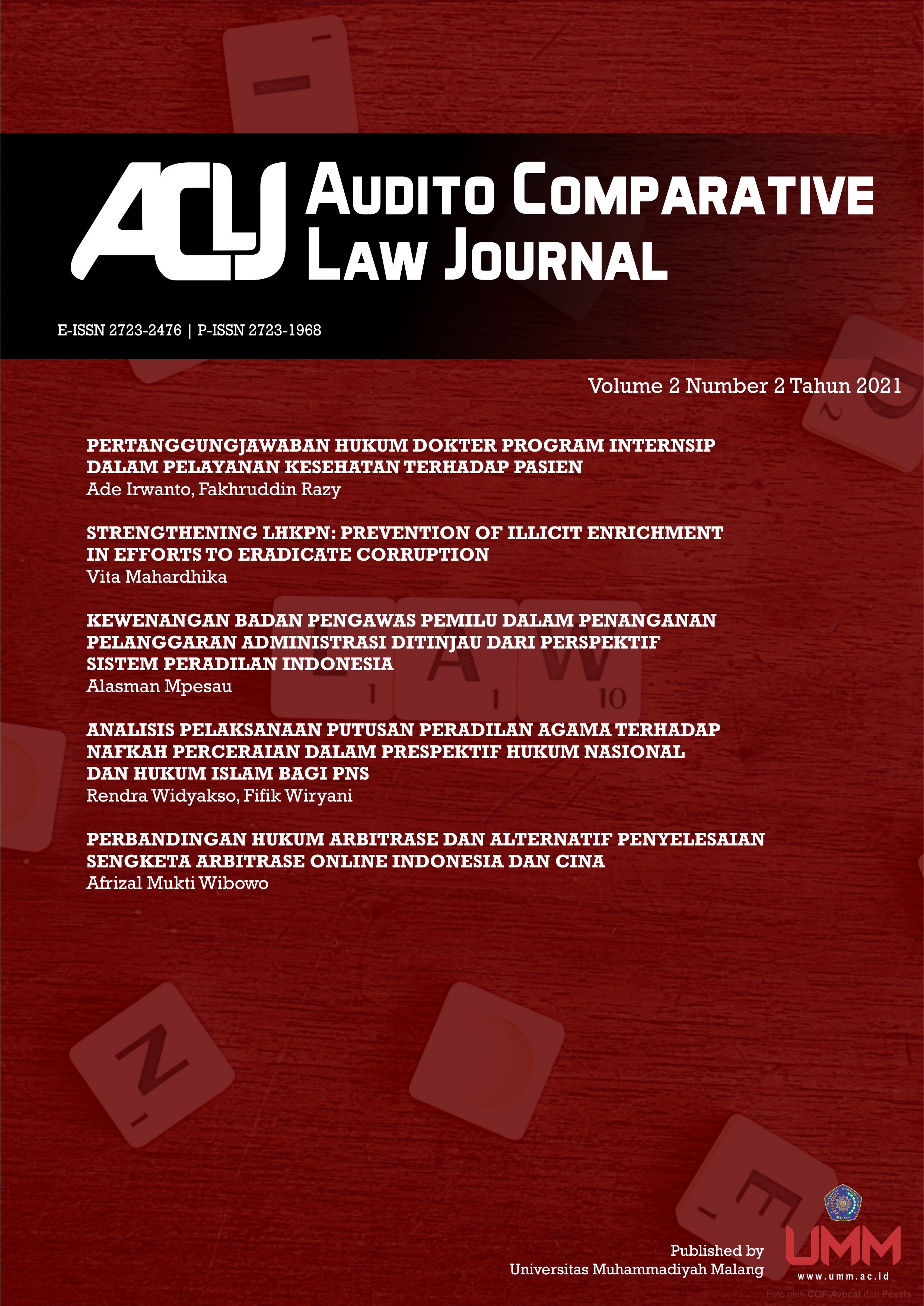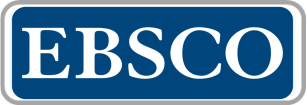STRENGTHENING LHKPN: PREVENTION OF ILLICIT ENRICHMENT IN EFFORTS TO ERADICATE CORRUPTION
DOI:
https://doi.org/10.22219/aclj.v2i2.16429Keywords:
Illicit Enrichment, LHKPN, CorruptionAbstract
This research aimed to discuss State Organizer's Asset Report or Laporan Harta Kekayaan Pejabat Negara (LHKPN) problems due to the eradication corruption process in Indonesia. This research is normative legal research with a conceptual, historical, and statutory approach. From the research it can be seen that as an effort to prevent illicit enrichment carried out by state officials, it is necessary to strengthen the wealth reports of state administrators, namely by making changes to Law Number 28 of 1999, from collusion, corruption, and nepotism. related to the form and mechanism of the application of sanctions. The recommendation is the law on the Free Implementation of Corruption should be strictly regulated regarding severe administrative sanctions in the form of types of penalties, that directly impact the position of state administrators, and criminal sanctions for state officials who are indicated to have falsified their reporting.
Downloads
References
Al-Fatih, S. (2018). Darus as an Anti-Corruption Education. Asia Pacific Fraud Journal, 3(1), 117–123. https://doi.org/10.21532/apfj.001.18.03.01.14
Cahyani, T. D., & Al-Fatih, S. (2020). Peran Muhammadiyah dalam pencegahan dan pemberantasan tindak pidana korupsi di kota batu. Justitia Jurnal Hukum, 4(2), 117–123. https://doi.org/10.21532/apfj.001.18.03.01.14.Volume
Haris, & Al-Fatih, S. (2020). School of Intuition as An Education for Child to Prevent Corruption in Indonesia. TEST Engineering & Management, 83, 11884–11892.
Hiariej, E. O. . (2019). United Nations Convention Against Corruption dalam Sistem Hukum Indonesia. Mimbar Hukum, 31(1). https://doi.org/https://doi.org/10.22146/jmh.43968
Indonesia Corruption Watch. (2014). Implementasi dan Pengaturan Illicit Enrichment (Peningkatan Kekayaan Secara Tidak Sah di Indonesia).
Irwansyah. (2020). Penelitian Hukum: Pilihan Metode & Praktik Penulisan Artikel (A. Yunus, Ed.). Yogyakarta: Mirra Buana Media.
Istiqomah, M. (2016). Kebijakan Formulasi Pengaturan “Illicit Enrichment” Sebagai Upaya Pemberantasan Tindak Pidana Korupsi. Jurnal Media Hukum, 23(1). https://doi.org/https://doi.org/10.18196/jmh.2015.0069.76-86
Marzuki, P. M. (2017). Penelitian Hukum. Jakarta: Kencana.
Peraturan Komisi Pemberantasan Korupsi Nomor 07 Tahun 2016 Tentang Tata Cara Pendaftaran, Pengumuman, dan Pemeriksaan Harta Kekayaan Penyelenggara Negara.
Peraturan Pemerintah Nomor 53 Tahun 2010 tentang Disiplin PNS.
Prodjodikoro, W. (2003). Asas-Asas Hukum Pidana. Bandung: Refika Aditama.
Rahardjo, S. (2010). Sosiologi Hukum Perkembangan Metode dan Pilihan Masalah. Yogyakarta: Genta Publishing.
Samidjo. (1985). Ringkasan dan Tanya Jawab Hukum Pidana. Bandung: CV. Armico.
Thalib, H., Rahman, S., & Semendawai, A. H. (2017). The Role of Justice Collaborator in Uncovering Criminal Cases in Indonesia. Diponegoro Law Review, 2(1), 27. https://doi.org/10.14710/dilrev.2.1.2017.27-39
Ulum, B. (2013). Menggagas Konsep Fikih Anti Korupsi: Solusi Alternatif Pemberantasan Korupsi di Indonesia. Al-Manahij: Jurnal Kajian Hukum Islam, 7(1), 77–88. https://doi.org/doi.org/https://doi.org/10.24090/mnh.v7i1.578
Undang-Undang Nomor 30 Tahun 2014 Tentang Administrasi Pemerintahan.
Waluyo, B. (2014). Optimalisasi Pemberantasan Korupsi di Indonesia. Jurnal Yuridis, 1(2), 169–182.
www.kpk.go.id. (2020). Tingkat Pelaporan Kepatuhan Harta Penyelenggara Negara Meningkat 8 Persen.
www.mediaindonesia.com. (2020). 169 Anggota DPR Belum Sampaikan LHKPN.
Yenti, G. (2012). Illicit Enrichment. Bandung: Citra Aditya Bakti.
Downloads
Published
How to Cite
Issue
Section
License
Copyright (c) 2021 Vita Mahardhika

This work is licensed under a Creative Commons Attribution-ShareAlike 4.0 International License.








